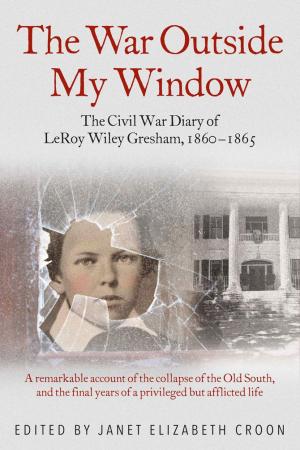Life and Death in the Old South
LeRoy Wiley Gresham is the brilliantly precocious son of a wealthy and prominent family in Macon, GA during the Civil War. Like his beloved Confederacy, LeRoy unknowingly suffers from a terminal disease, and he dies shortly after the end of the war. Meanwhile, he keeps a meticulous diary during the war years that reports daily on the weather, his own health, the progress of the armies, the doings of his family and their slaves, the goings to and from their two contiguous plantations south of Macon and news from their large and far-flung family and their many friends and social acquaintances.

His diary is now edited by Janet Croon and published by Savas Beatie Publishing as The War Outside My Window: The Civil War Diary of LeRoy Wiley Gresham, 1860-1865.
The dedicated diarist is as clear-eyed and dispassionate describing the draining abscess on his back as he is critiquing the movements of armies and the decisions of generals: “Wednesday October 1st 1862: Warm + clear. Slept miserable and feel bad in proportion today. Took some Porter on retiring which had the delightful effect of making me sick at the stomach. Coughed at intervals in the night and today. Everybody (so to speak) seems to have been hurt at Sharpsburg. The Troup Artillery of Athens and 900 of Cobb’s Legion reported prisoners. Our loss must amount to 9,000 in all. ‘Personna’ has a splendid acct of the fight this morning. Mary is sick + Julia Ann cooks.”
And so his account goes day after day for the four years of the war. Though he is essentially bedridden, except for his wagon pulled around by Allen, a slave his age, and later by Bill, LeRoy is avidly involved in the lives of his parents, his younger sister Minnie and his older brother, Thomas, as well as their many aunts, uncles and cousins who come for visits and constantly write letters back and forth.
The plot thickens as the war moves ever closer to Macon, though the city surrenders without a fight and is relatively peacefully occupied by U.S. troops, some of whom actually board with the Greshams.
Robbed of his youth, LeRoy soldiers on with wit, curiosity and love, constantly enjoying visits, devouring books and attacking at chess. The War Outside My Window gives us a long, lingering look back through the pane at the lives of some upper-class Georgians and their world around Macon and beyond, which is ultimately devastated by the battles and the sickness that the young diarist so faithfully chronicles.
Diary reads like an old-fashioned novel written by a lively and perceptive observer surrounded by a cast of strongly drawn characters against the backdrop of a distant war which is a life or death struggle for their world.
LeRoy remains the objective observer to the end, finally understanding that it is just a matter of time for his beloved Confederacy and realizing that he, too, is doomed.
Diary is also an excellent, bite-sized history of a family, a place, a time and a world, just before all is swept away by the end of the war, the end of slavery and the end of the plantation economy. The Greshams survive the war, LeRoy’s death, the loss of their fortune and their way of life, and gradually adapt to their new world. One longs for another LeRoy to tell this story.
Editor Croon knew that the raw diary, as insightful as it is, would be confusing in the extreme to the unguided modern reader, so she carefully and fulsomely explains who everybody is among the extended family and the servants. When LeRoy mentions somebody in the diary, she explains who it is in a footnote, and the same goes for the battles, the generals, Macon society and the history unfolding around them all.
The book has a few pictures and some good maps, a stunningly comprehensive index and a medical afterword explaining LeRoy’s illness—apparently spinal tuberculosis—which the medicine of the time could not treat, except for palliatives to ease his symptoms.
At 4 p.m. Wednesday, Sept. 26 at the T.R.R. Cobb House, 175 Hill St., Croon will discuss the Diary and how it came to be published. She will also be available to autograph copies of the book, which will be for sale.
More by Pete McCommons
-
Voting Absentee: Necessary But Not Easy
Pub Notes
-

Be Ready When National TV Comes Calling
Pub Notes
-










comments